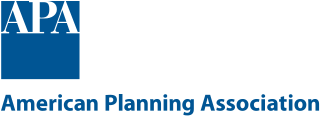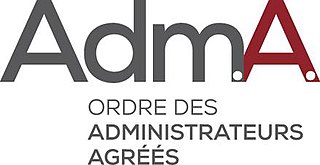Professional certification, trade certification, or professional designation, often called simply certification or qualification, is a designation earned by a person to assure qualification to perform a job or task. Not all certifications that use post-nominal letters are an acknowledgement of educational achievement, or an agency appointed to safeguard the public interest.

The American Planning Association (APA) is a professional organization representing the field of urban planning in the United States. APA was formed in 1978, when two separate professional planning organizations, the American Institute of Planners and the American Society of Planning Officials, were merged into a single organization. The American Institute of Certified Planners is now the organization's professional branch.

The Canadian Securities Institute is a Canadian organization that offers licensing courses, advanced certifications, continuing education and custom training for financial services professionals in Canada and internationally.

A financial planner or personal financial planner is a qualified financial advisor. Practicing in full service personal finance, they advise clients on investments, insurance, tax, retirement and estate planning.
The American Institute of Certified Planners (AICP) is the American Planning Association's professional institute. AICP certifies professionals in the United States in the field of town planning and assists planners in the areas of ethics, professional development, planning education, and the standards of planning practice. Members of AICP pledge to adhere to a detailed Code of Ethics and Professional Conduct. Once certified, professional planners may place the designation "AICP" after their name to indicate their membership in AICP, and their mastery of the principles, skills, knowledge, and experience determined by the organization as essential for a professional planner.
The Certified Financial Planner certification is a professional certification mark for financial planners conferred by the Certified Financial Planner Board of Standards in the United States, and by 25 other organizations affiliated with the Financial Planning Standards Board (FPSB), the owner of the CFP mark outside of the United States. The certification is generally considered the gold standard in the financial planning industry. The certification is managed by the Certified Financial Planner Board of Standards, Inc., which was founded in 1985 as a 501(c)(3) non-profit organization; it is neither a government designation nor an accredited degree.

A financial adviser or financial advisor is a professional who provides financial services to clients based on their financial situation. In many countries, financial advisors must complete specific training and be registered with a regulatory body in order to provide advice.

In general usage, a financial plan is a comprehensive evaluation of an individual's current pay and future financial state by using current known variables to predict future income, asset values and withdrawal plans. This often includes a budget which organizes an individual's finances and sometimes includes a series of steps or specific goals for spending and saving in the future. This plan allocates future income to various types of expenses, such as rent or utilities, and also reserves some income for short-term and long-term savings. A financial plan is sometimes referred to as an investment plan, but in personal finance, a financial plan can focus on other specific areas such as risk management, estates, college, or retirement.
The financial management advisor (FMA) is a professional designation of the Canadian Securities Institute (CSI), the official educator of the Canadian securities industry. The FMA is a personal financial planning designation which is usually a precursor to the certified financial planner (CFP) designation. There are over three thousand FMA holders in Canada. The FMA designation is not recognized in the province of Quebec.
In the United States certified mortgage planner is a designation for the purpose of establishing a new professional category in the mortgage sector: one that arose as a response to criticisms of the mortgage banking industry. The term "mortgage planner" has been adopted as a generic niche term for mortgage originators who choose to assist borrowers on a more personal level by incorporating the mortgage decision with a borrowers short and long-term financial objectives. The term "certified mortgage planner" is an effort to validate through education and subsequent certification a mortgage originator that has had specific training for the purpose of incorporating the mortgage decision with a Borrowers short and long-term financial objectives.
A professional transportation planner is a professional engaged in the practice of transportation planning, relating to the transportation aspects of urban planning and infrastructure planning.

The Canadian Institute of Planners (CIP) is a professional organization in Canada for those involved in land use planning. It is responsible for advocating at national and international levels for members, developing public policy positions, and providing services to members. The Institute has over 8,000 members from across Canada and around the world, and works closely with the eleven Provincial and Territorial Institutes and Associations (PTIAs). It was founded in 1919.
Following is a partial list of professional certifications in financial services, with an overview of the educational and continuing requirements for each; see Professional certification § Accountancy, auditing and finance and Category:Professional certification in finance for all articles. As the field of finance has increased in complexity in recent years, the number of available designations has grown, and, correspondingly, some will have more recognition than others. Note that in the US, many state securities and insurance regulators do not allow financial professionals to use a designation — in particular a "senior" designation — unless it has been accredited by either the American National Standards Institute or the National Commission for Certifying Agencies.
Advocis, The Financial Advisors Association of Canada (TFAAC) is the largest voluntary professional membership association of financial advisors in Canada, representing more than 13,000 members and 40 chapters across the country.
An urban planner is a professional who practices in the field of town planning, urban planning or city planning.
Certified Financial Planner Board of Standards, Inc., is an American 501(c)(6) nonprofit organization that sets and upholds standards for financial planning. It administers Certified Financial Planner certification - which is widely recognized by the public, advisors, and firms as the standard for financial planners - so that the public has access to the benefits of competent and ethical financial planning. CFP certification is held by more than 95,000 people in the United States.
Urban planning education is a practice of teaching and learning urban theory, studies, and professional practices. The interaction between public officials, professional planners and the public involves a continuous education on planning process. Community members often serve on a city planning commission, council or board. As a result, education outreach is effectively an ongoing cycle. Formal education is offered as an academic degree in urban, city, rural, and/or regional planning, and more often awarded as a master's degree specifically accredited by an urban planning association in addition to the university's university-wide primary accreditation, although some universities offer bachelor's degrees and doctoral degrees also accredited in the same fashion; although most bachelor's degrees in urban planning do not have the secondary-layer of urban planning association accreditation required for most positions, relying solely on the university's primary accreditation as a legitimate institution of higher education. At some universities, urban studies, also known as pre-urban planning, is the paraprofessional version of urban and regional planning education, mostly taken as a bachelor's degree prior to taking up post-graduate education in urban planning or as a master's or graduate certificate program for public administration professionals to get an understanding of public policy implications created by urban planning decisions or techniques.

The Ordre des administrateurs agréés du Québec (Adm.A.) is a professional Order mandated by the Government of Quebec (Canada) to regulate the practice of the "Administrateurs agréés".
The Institute of Financial Planning is the only organization in Quebec (Canada) authorized to grant the financial planning diploma which leads to the Financial Planner (F.Pl.) title.
Chartered Financial Divorce Specialist (CFDS) is a Canadian professional designation that can be earned by eligible individuals holding a recognized financial designation and have completed specific training in the financial aspects of life transitions with respect to collaborative (mediated) cohabitation, marriage agreements, relationships or marital breakdowns. It is based on professional best practice standards and a code of professional ethics, granted and monitored by the Academy of Financial Divorce Specialists in Ontario, Canada and other relevant licensing authorities.





